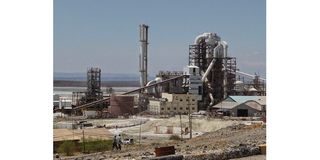Revival of $400m soda ash project back ‘on track’

What you need to know:
- A soda ash project was planned in Oldonyo Lengai near Lake Natron, but the National Development Corporation (NDC) dropped the area due to environmental reasons and the fact that the site is a breeding area for laser flamingos.
Dar es Salaam. The long-awaited soda ash project worth $400 million in Monduli's Engaruka ward is back on track, with the government planning to begin mobilising investors by July of this year.
A soda ash project was planned in Oldonyo Lengai near Lake Natron, but the National Development Corporation (NDC) dropped the area due to environmental reasons and the fact that the site is a breeding area for laser flamingos.
The government discovered the soda ash in the Engaruka ward in Monduli, where the project will now be implemented.
The ministry of Industry and Trade permanent secretary, Dr Hashil Abdallah, said President Samia Suluhu Hassan has already released over Sh40 billion to compensate around 300 villagers living near the project so that they can vacate the area to allow for implementation.
A team of experts from the Ministry of Finance, Arusha Regional Office, and Monduli District has started the verification before paying the compensations.
“We thank our president for deciding that the implementation of the project can begin. The project will be of great benefit to producers of glass and other products that use soda ash as raw materials,” said Dr Abdallah in an interview.
Dr Abdallah said that three weeks ago, a team of permanent secretaries from the Ministry of Finance and Minerals visited the site to look at various issues, including compensation to residents.
“There are more than ten investors from different nations who have already shown their interest in investing in the project. We do not doubt that investors are waiting for us to take it to the market officially, and we are determined to make this happen before the end of this financial year,” he said, adding that the Engaruka area has a potential deposit of 400.3 million metric tonnes that can be explored for over 150 years.
Speaking to The Citizen yesterday, Ministry of Finance deputy permanent secretary-economic management, Mr Elijah Mwandumbya, said the soda ash project is one of the strategic projects that the government has decided to implement and that it will have benefits.
According to him, in Tanzania, factories that produce soda ash spend over $200 million importing it, adding that the government has decided to ensure such raw materials are available in the country.
Mr Mwandumbya added that the implementation of the project will reduce the cost of production in those factories, meaning that the price of the products will decrease in the market because the raw materials will be available locally.
Another advantage that the country will get from such a project is technological transformation, as locals will learn various issues on how to use new technologies for production.
Furthermore, there would be a factory that would process the soda ash, whereby people around the area would get employment and use new technologies; likewise, social services such as roads, electricity, and water would be available, which means that development in the district would be stimulated by the presence of the mine.
He said soda ash is extensively used for the manufacturing of glasses, fertilisers, dyes and colouring agents; petroleum refineries; metallurgical (iron and steel) industries; and soap and detergent industries, to mention a few.
An economist from the University of Dar es Salaam, Dr Wilhelm Ngasamiaku, said the investment in the project is huge and its implementation will help reduce the use of foreign exchange to import raw materials, which means it will strengthen the shilling.
Soda ash products are also needed in African markets, posing the potential to help Tanzania increase the products for sale in the African Continental Free Trade Area (AfCFTA).
“We realise that this is a long-term project that was stopped in the Lake Natron area for environmental reasons. It is a big investment that will increase the production of glass products and beverage bottles, and exports will increase if the government implements it,” he said.




